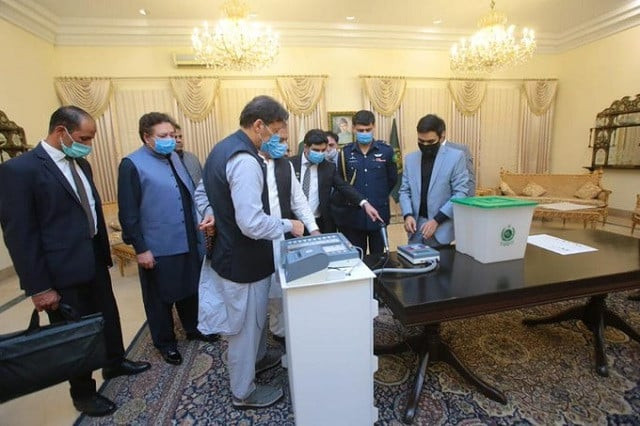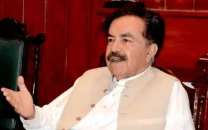ECP hints at using EVMs in next elections
Says its technical evaluation committee on board with science ministry

The Election Commission of Pakistan on Saturday observed that it was open to employ Electronic Voting Machines (EVMs) in the 2023 general elections provided their use was proved beneficial and added that its technical evaluation committee was on board with the Ministry of Science and Technology on the matter.
The ruling PTI maintains that the EVM would help conduct fair, free and transparent elections in the country and enable the overseas Pakistanis to cast their votes. It had been pursuing the issue of the use of machines since the 2013 general elections and had raised the matter on multiple occasions.
The EVM has been developed by the Ministry of Science and Technology in collaboration with the COMSATS University Islamabad and the National Institute of Electronics, Islamabad.
According to the science ministry, the EVM is a user-friendly machine and would help stop rigging in future elections. The total cost of one machine is approximately Rs70,000 and almost 400,000 EVMs would be required in the 2023 general elections costing the national exchequer around Rs28 billion.
Regarding the apprehensions of the opposition members, the science ministry says that the weather will not affect the EVM because the chip embedded in it is weather resistant and could not be hacked due to its non-connectivity with the internet.
In a statement on Saturday, the ECP maintained that principally it was in favour of the use of technology but stressed that the technology must be developed keeping in view the ground realities besides enjoying the confidence of all stakeholders, including political parties, civil society and voters.
The commission said it had formed a technical evaluation committee on the EVMs which was holding consultation with the science ministry on the matter.
The ECP noted that it would support the use of EVMs in the next general elections if a consensus with the science ministry was achieved on it.
On August 17, the Ministry of Science and Technology had briefed the ECP on the EVMs functions.
Read NA panel seeks meeting of all parties on EVM
Minister of Science and Technology Shibli Faraz assured the commission that all its concerns would be addressed, noting that the prototype was open to modifications.
The election commission constituted a technical evaluation committee to examine the machine in detail and present its report to it.
The ECP approved hiring of a technical consultant to assist it about the EVM, internet voting for overseas Pakistanis, data centres, preparation of electoral rolls and other related projects.
Speaking on the occasion, Chief Election Commissioner Sikandar Sultan Raja maintained that they supported the use of technology, but wanted a machine that did not sabotage the system. The government assured the commission to further improve the EVMs.
Later, while speaking to media, Faraz said Prime Minister Imran Khan had directed that that the next elections should be held through EVMs even if the results were against the ruling PTI. “Manual elections have not given us anything [so far],” he added.
The minister said the ECP officials had raised about 75 questions, and the ministry had answered all of them.
"The chief election commissioner also congratulated us on building the machine. Unfortunately, every election in this country is marred by controversy. The parliament will legislate on EVMs,” Faraz said adding that timelines would be drawn for the purpose.
“If the opposition wants to make the elections in the country transparent, let’s negotiate [on the issue]. They should give their suggestions on electronic voting.”
He added that there was nothing secret in the machine and their only purpose was to bring transparency to the electoral process.
“We are making efforts that the election process should involve more technology and reduce human interference,” Faraz said.
“The ECP is a constitutional institution and the government cannot dictate it.”
The CEC said the ECP was, in principle, in favour of using technology for the polls.



















COMMENTS
Comments are moderated and generally will be posted if they are on-topic and not abusive.
For more information, please see our Comments FAQ